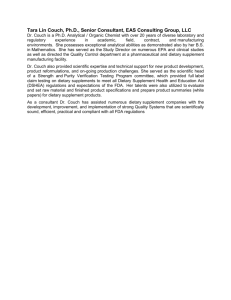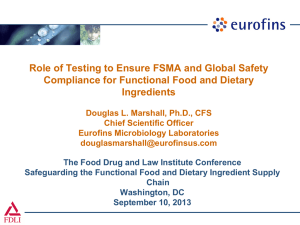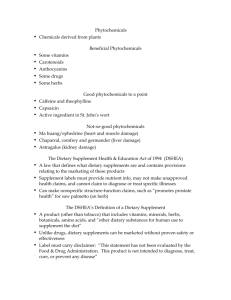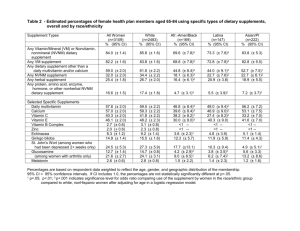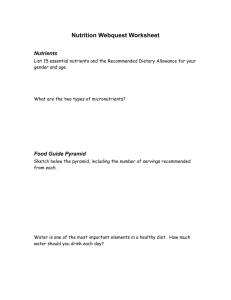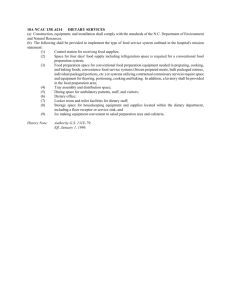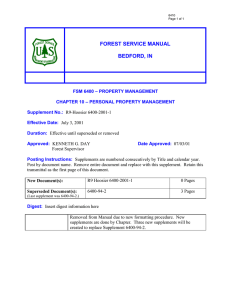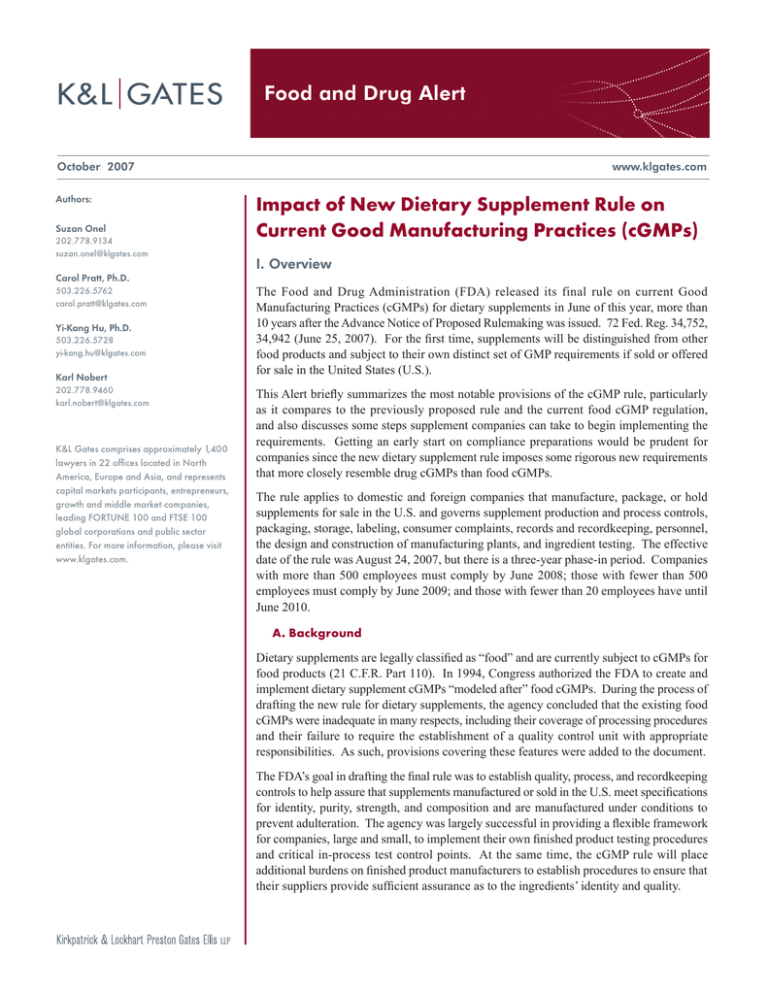
Food and Drug Alert
October 2007
Authors:
Suzan Onel
202.778.9134
suzan.onel@klgates.com
Carol Pratt, Ph.D.
503.226.5762
carol.pratt@klgates.com
Yi-Kang Hu, Ph.D.
503.226.5728
yi-kang.hu@klgates.com
Karl Nobert
202.778.9460
karl.nobert@klgates.com
K&L Gates comprises approximately 1,400
lawyers in 22 offices located in North
America, Europe and Asia, and represents
capital markets participants, entrepreneurs,
growth and middle market companies,
leading FORTUNE 100 and FTSE 100
global corporations and public sector
entities. For more information, please visit
www.klgates.com.
www.klgates.com
Impact of New Dietary Supplement Rule on
Current Good Manufacturing Practices (cGMPs)
I. Overview
The Food and Drug Administration (FDA) released its final rule on current Good
Manufacturing Practices (cGMPs) for dietary supplements in June of this year, more than
10 years after the Advance Notice of Proposed Rulemaking was issued. 72 Fed. Reg. 34,752,
34,942 (June 25, 2007). For the first time, supplements will be distinguished from other
food products and subject to their own distinct set of GMP requirements if sold or offered
for sale in the United States (U.S.).
This Alert briefly summarizes the most notable provisions of the cGMP rule, particularly
as it compares to the previously proposed rule and the current food cGMP regulation,
and also discusses some steps supplement companies can take to begin implementing the
requirements. Getting an early start on compliance preparations would be prudent for
companies since the new dietary supplement rule imposes some rigorous new requirements
that more closely resemble drug cGMPs than food cGMPs.
The rule applies to domestic and foreign companies that manufacture, package, or hold
supplements for sale in the U.S. and governs supplement production and process controls,
packaging, storage, labeling, consumer complaints, records and recordkeeping, personnel,
the design and construction of manufacturing plants, and ingredient testing. The effective
date of the rule was August 24, 2007, but there is a three-year phase-in period. Companies
with more than 500 employees must comply by June 2008; those with fewer than 500
employees must comply by June 2009; and those with fewer than 20 employees have until
June 2010.
A. Background
Dietary supplements are legally classified as “food” and are currently subject to cGMPs for
food products (21 C.F.R. Part 110). In 1994, Congress authorized the FDA to create and
implement dietary supplement cGMPs “modeled after” food cGMPs. During the process of
drafting the new rule for dietary supplements, the agency concluded that the existing food
cGMPs were inadequate in many respects, including their coverage of processing procedures
and their failure to require the establishment of a quality control unit with appropriate
responsibilities. As such, provisions covering these features were added to the document.
The FDA’s goal in drafting the final rule was to establish quality, process, and recordkeeping
controls to help assure that supplements manufactured or sold in the U.S. meet specifications
for identity, purity, strength, and composition and are manufactured under conditions to
prevent adulteration. The agency was largely successful in providing a flexible framework
for companies, large and small, to implement their own finished product testing procedures
and critical in-process test control points. At the same time, the cGMP rule will place
additional burdens on finished product manufacturers to establish procedures to ensure that
their suppliers provide sufficient assurance as to the ingredients’ identity and quality.
Food and Drug Alert
B. Summary
Food-like cGMP Requirements
Like the food cGMPs, the dietary supplement cGMPs
contain provisions governing facilities, methods,
practices, and controls used in product manufacturing,
packaging, labeling, and holding that are intended
to ensure the safety and quality of finished dietary
supplement products. Provisions of the new dietary
supplement cGMPs that are similar or identical to
the food cGMPs include requirements related to
personnel (education, training, and cleanliness);
physical plant and grounds (construction, maintenance,
waste treatment, and lighting); equipment and utensils
(design, maintenance, and cleaning); and product and
process control systems (quality controls, raw material
inspection and storage, defect action levels, packaging
and labeling, storage, and transportation).
Unlike the proposed rule issued in 2003 (68 Fed.
Reg. 12,157, March 13, 2003), the final rule only
applies to companies that manufacture, package, or
hold dietary supplement products. It does not apply
to manufacturers or suppliers of dietary ingredients.
The final rule also is not applicable to retailers of
dietary supplements and the FDA will use its
enforcement discretion with regard to products made
by practitioners such as acupuncturists and herbalists
who are “adequately trained in their profession” and
who use the products on “one-on-one” consultation.
The final rule gives companies more flexibility in
determining appropriate finished product testing,
no longer requiring that each finished batch of the
dietary ingredient or dietary supplement be tested
against specifications before release for distribution.
Also, companies have the option of either testing a
subset of finished batches based on a sound statistical
sampling or testing all finished batches of the
supplements. And companies have more flexibility in
determining employees’ qualifications and designing
the manufacturing facilities.
Drug-like cGMP Requirements
At the same time, many of the provisions are more
drug-like in scope. For example, one of the most
significant features of the new rule is the requirement
that supplement manufacturers confirm the identity
of each dietary ingredient prior to use by testing
or examination. Under the new rule, reliance on a
certificate of analysis or test data from the supplier is
not sufficient to confirm dietary ingredient identity. A
companion interim final rule issued by the agency at
the same time as the final cGMP rule provides some
flexibility to the mandatory 100% ingredient testing
requirement by allowing companies to petition for an
exemption when there are no validated test methods
and other controls are in place to verify the ingredient.
72 Fed. Reg. 34,959, 34,968 (June 25, 2007). However,
it is currently unclear how FDA will implement the
petition process.
Other provisions similar or identical to the drug
cGMPs include the creation of a quality control unit
with authority to approve or reject a finished product;
laboratory controls; the creation and retention of master
product, batch product, and control records; expanded
recordkeeping and reporting requirements that include
provisions related to document retention, access
and inspection; expanded packaging and labeling
requirements that include controls governing certain
product forms (e.g., tablets, capsules, powder, softgels);
product complaint controls; and procedures for dealing
with returned products and product salvaging.
II. Notable Provisions
A. Production and Control Systems
Under the final rule, dietary supplement manufacturers
are required to implement a system of production and
process controls to cover all stages of manufacturing,
packaging, labeling and holding of dietary supplements
to ensure product quality and that the product
is packaged and labeled as specified in the master
manufacturing record. The quality control provisions
require manufacturers to establish control procedures
for all processes; specifications; controls, tests and
examinations; and deviations from or modifications
to control procedures.
Unlike the food cGMPs, the final rule requires
supplement manufacturers to evaluate the identity,
purity, strength, and composition of their dietary
supplements. Every dietary ingredient used in a dietary
supplement will be required to meet “100% identity
testing,” such that manufacturers will be required to
conduct at least one appropriate test or examination to
verify the identity of any component that is a dietary
ingredient.
October 2007 | Food and Drug Alert
In addition to dietary ingredients, manufacturers
also will be required to confirm the identity of other
components. The new rule allows the option to use
a certificate of analysis from a component supplier
instead of requiring that manufacturers conduct tests
or examinations on the components they receive.
However, the manufacturers will need to qualify
each supplier by confirming its tests or conducting
examinations on a regular basis.
B. Storage
The final rule requires dietary supplement companies to
follow written procedures for holding and distributing
operations. These procedures must include provisions
to assure that components and dietary supplements
are held under appropriate conditions of temperature,
humidity, and light so that the identity, purity, strength,
and composition of the components and final products
are not affected. The final rule also requires that dietary
supplement companies store components, supplements,
packaging, and labeling under conditions that do not
lead to their mix- up, contamination, or deterioration.
These provisions closely resemble drug cGMPs.
C. Product Complaints
The final rule requires firms that manufacture, package,
label, or hold dietary supplements to establish and
follow written procedures for handling product
complaints. Under the new cGMPs, firms are required
to record and retain all product complaints received.
Also, all product complaints must be reviewed by a
“qualified person” of the firm who, when necessary,
must investigate a complaint to identify possible
production or process control failures and any potential
deviations from the cGMPs. Decisions concerning
whether or not to investigate must be reviewed and
approved by quality control personnel, who are also
responsible for reviewing the findings of all conducted
investigations.
FDA already requires that “serious adverse events”
be reported to the agency. See “New Adverse Event
Reporting Requirements for OTC Drugs and Dietary
Supplements,” K&L Gates Client Alert (January 2007).
FDA encourages companies to notify the agency of
product complaints that are not “serious adverse
events,” but include reports of illness or injury.
D. Recordkeeping Provisions
Under the final rule, dietary supplement manufacturers
must keep written records for either 1 year past the shelf
life date, if a shelf life date is used, or 2 years postdistribution of the last batch of dietary supplements
associated with those records. Dietary supplement
records are required to be kept as original records,
true copies, or as electronic records. The final rule
also requires dietary supplement manufacturers to
keep these records available for inspection by the FDA
when requested.
The final rule does not require expiration dating on
supplements, but companies that use such dating must
have stability data to support the shelf life date.
III. Impact
It is too soon to know the full impact of the final rule
on large and small supplement companies. However,
one thing is clear, manufacturers will need to begin
developing internal standard operating procedures
(“SOPs”) for implementing the requirements as
to their products. Some SOPs to consider are: (1)
product specific in-process and finished product testing
protocols, (2) written procedures to document process
controls, (3) written procedures to document the
results of tests and evaluations, (4) written procedures
with respect to transportation handling procedures,
particularly for ingredients that are vulnerable to
excessive heat or cold, and (5) written procedures
to assure that ingredients received from third-party
suppliers meet certain minimum requirements including
a complete and comprehensive certificate of analysis.
One area that will require particular focus is receipt
of incoming ingredients from third-party suppliers.
Because ingredient suppliers are not subject to the final
rule, manufacturers are likely to increase the contractual
obligations they place on suppliers to assure consistent
quality. Some likely demands will be: (1) increased
requests for an FDA guaranty under Section 303(c)
of the Federal Food, Drug, and Cosmetic Act and 21
C.F.R. § 7.12, (2) increased quality control assurances
and documentation to establish that ingredients are
accurately represented and are of the expected quality,
(3) required pre-qualification audits and routine audits
by the finished product manufacturer or third-party
auditors, and (4) detailed certificates of analysis that
include information such as a description of the tests
October 2007 | Food and Drug Alert
or examination methods used, the limits of the tests
or examinations, and the actual results of the tests or
examinations.
While a false certificate of analysis currently only
affords the manufacturer with a breach of contract
cause of action and no legal redress under the cGMP
rule, it is possible that governmental agencies such
as the Federal Trade Commission and state attorney
generals may become interested in pursuing action
against suppliers that provide false or misleading
certificates of analysis to supplement manufacturers.
If this occurs, ingredient suppliers could be drawn into
compliance with the cGMP rule and have legal liability
for assuring the identity and quality of the ingredients
they are providing to supplement manufacturers.
Additionally, consumers may have a private cause of
action under some state consumer fraud statutes.
Finally, with the recent melamine contamination of
China-manufactured pet food and other food safety
issues arising due to the ever-expanding world
marketplace, House Energy and Commerce Committee
Chairman John Dingell is publicly questioning the
FDA’s interim final rule which allows for companies
to seek an exemption from the 100% identity testing
requirement. Even with the exemption from the 100%
identity testing requirement, companies must keep
in mind that if the supplement contains non-dietary
ingredient binders or excipients, they must assure those
ingredients are either generally recognized as safe
(“GRAS”) or comply with the food additive regulations
in addition to complying with the other provisions of
the cGMP rule.
If you have any questions about the new supplement
requirements or establishing internal SOPs, please
contact Suzan Onel (202-778-9134 or suzan.onel@
klgates.com), Carol Pratt (503.226.5762 or carol.
pratt@klgates.com), Yi-Kang Hu (503.226.5728 or
yi-kang.hu@klgates.com), Karl Nobert (202-778-9460
or karl.nobert@klgates.com), or any member of the
Food and Drug Practice.
_______________________________________
We gratefully acknowledge the assistance of
Michelle Bradbury, K&L Gates Summer Associate.
K&L Gates comprises multiple affiliated partnerships: a limited liability partnership with the full name Kirkpatrick & Lockhart Preston Gates Ellis LLP qualified
in Delaware and maintaining offices throughout the U.S., in Berlin, and in Beijing (Kirkpatrick & Lockhart Preston Gates Ellis LLP Beijing Representative
Office); a limited liability partnership (also named Kirkpatrick & Lockhart Preston Gates Ellis LLP) incorporated in England and maintaining our London
office; a Taiwan general partnership (Kirkpatrick & Lockhart Preston Gates Ellis) which practices from our Taipei office; and a Hong Kong general
partnership (Kirkpatrick & Lockhart Preston Gates Ellis, Solicitors) which practices from our Hong Kong office. K&L Gates maintains appropriate registrations
in the jurisdictions in which its offices are located. A list of the partners in each entity is available for inspection at any K&L Gates office.
This publication/newsletter is for informational purposes and does not contain or convey legal advice. The information herein should not be used or relied
upon in regard to any particular facts or circumstances without first consulting a lawyer.
Data Protection Act 1998—We may contact you from time to time with information on Kirkpatrick & Lockhart Preston Gates Ellis LLP seminars and with our
regular newsletters, which may be of interest to you. We will not provide your details to any third parties. Please e-mail london@klgates.com if you would
prefer not to receive this information.
©1996-2007 Kirkpatrick & Lockhart Preston Gates Ellis LLP. All Rights Reserved.
October 2007 |

